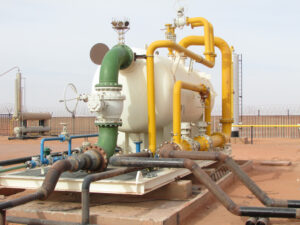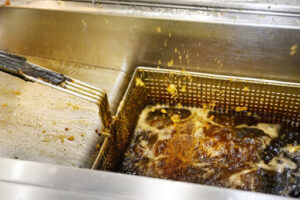Proper Grease Disposal Practices for Restaurants
Restaurants generate significant amounts of grease and used cooking oil, and improper disposal can lead to severe plumbing issues and environmental hazards. So, what do restaurants do with grease, and how do they dispose of cooking oil effectively? Let’s explore these questions and more.
The Problem With Grease
Grease management is a critical component of restaurant operations. Grease and cooking oil are byproducts of frying, grilling, and sautéing, and without proper disposal methods, they can cause serious problems such as clogged drains and sewer backups. Additionally, improper disposal poses environmental risks, as grease can contaminate water systems and harm wildlife.
Grease Traps: The First Line of Defense
Grease traps are essential pieces of equipment in commercial kitchens. They intercept fats, oils, and grease (FOG) before they enter the sewer system. Grease traps work by slowing down the flow of wastewater, allowing the grease to separate and float to the top while the cleaner water exits the trap.
The Role of Grease Trap Maintenance
Regular grease trap cleaning is necessary to prevent clogs and foul odors. Accumulated grease can harden and cause blockages, leading to costly repairs. A reputable grease collection company can assist with routine maintenance and help make sure your restaurant grease traps function efficiently.
How Restaurants Dispose of Cooking Oil
Restaurant cooking oil disposal is a multi-step process that involves collection, recycling, and sometimes repurposing. Here’s typically how restaurants dispose of cooking oil:
Collection and Recycling
Most restaurants partner with grease collection companies that specialize in collecting used cooking oil. These companies provide containers for the safe storage of used oil, which they pick up on a scheduled basis.
Recycling is a common method for restaurant cooking oil disposal. The collected oil is processed and repurposed into various products, such as biofuel, animal feed, and industrial lubricants. This process helps reduce waste and supports sustainability efforts.
Grease Interceptors
Similar to grease traps, grease interceptors are larger systems installed underground. They handle higher volumes of wastewater and are often used in larger establishments. Regular cleaning and maintenance are vital to their effectiveness.
Consequences of Improper Grease Disposal
Improper restaurant cooking oil disposal can lead to several issues, both for the restaurant and the environment.
Plumbing Problems
Grease can solidify and accumulate in pipes, leading to severe blockages. This can cause sewer backups, which are not only costly to fix but can also halt restaurant operations. Consistent grease trap maintenance helps avoid these problems.
Environmental Impact
When grease and oil enter the sewer system untreated, they can cause significant environmental damage. Oil waste can contaminate water sources, harm wildlife, and disrupt ecosystems. Proper disposal methods, such as recycling, help mitigate these effects.
Innovative Uses for Recycled Grease
The recycling of used cooking oil has led to some innovative and environmentally friendly uses. Here are a few ways recycled grease is repurposed:
- Biofuel Production: Used cooking oil is a valuable resource for biofuel production. Biofuels are a renewable energy source that can power vehicles and machinery, reducing reliance on fossil fuels and lowering greenhouse gas emissions.
- Animal Feed: Processed grease can be used in the production of animal feed. This provides a cost-effective and sustainable way to repurpose waste products, supporting agricultural industries.
- Industrial Applications: Recycled grease is also used in various industrial applications, including the manufacturing of soaps, detergents, and other products. This reduces waste and promotes the circular economy.
Common Misconceptions About Grease Disposal
Now that we’ve reviewed how restaurants dispose of cooking oil, it’s time to address several misconceptions about grease disposal that can lead to improper practices. Here are a few myths debunked:
Myth: It’s Okay to Pour Grease Down the Drain
Pouring grease down the drain is a recipe for disaster. Even if it’s in liquid form, grease can solidify in pipes, causing clogs and backups. Always use designated containers for grease disposal.
Myth: Grease Traps Don’t Need Regular Cleaning
Some believe that grease traps can go long periods without cleaning. However, neglecting regular maintenance can lead to severe blockages and odors. Routine cleaning is essential for proper functioning.
Myth: Used Cooking Oil Isn’t Valuable
As mentioned, used cooking oil is a valuable resource that can be recycled and repurposed. From biofuels to animal feed, recycled restaurant grease has numerous applications that support sustainability.
Contact Us Today for Cooking Oil Collection Services!
Managing grease and used cooking oil is a critical aspect of running a successful business. So, what do restaurants do with grease? As you can see, the best option is to schedule restaurant cooking oil disposal services to protect your plumbing system, support environmental sustainability, and comply with local regulations.
If you’re a restaurant owner looking to improve your grease management practices, consider scheduling service with A&J Sewer Service. Our professional team specializes in kitchen oil collection and grease trap cleaning in Chicago, IL, and the surrounding areas. Contact us today to learn more about how we can help keep your kitchen running efficiently!



